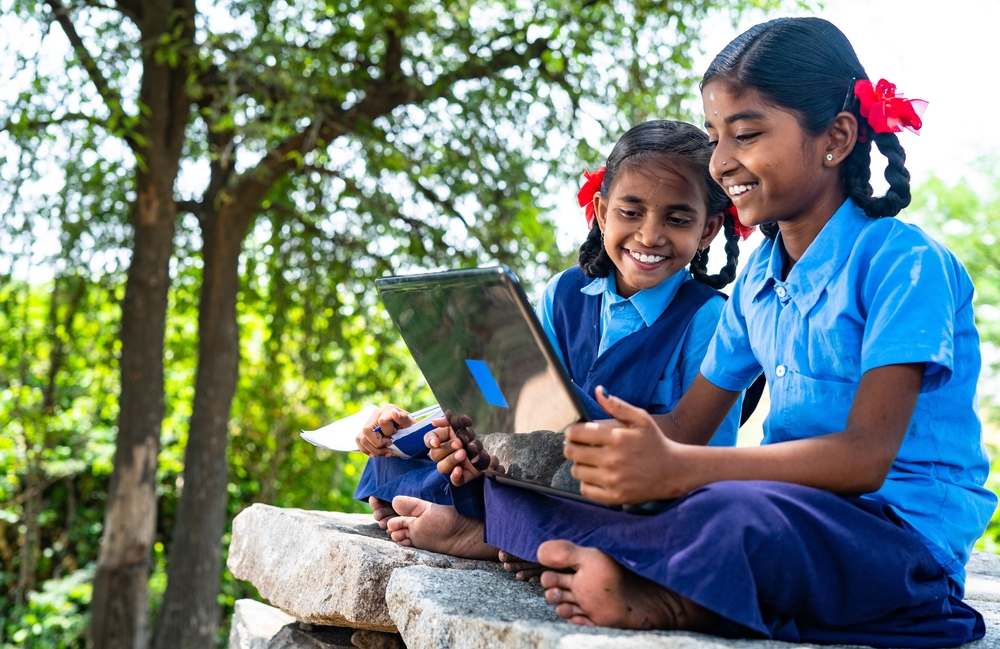India’s education landscape faces the critical challenge of improving learning outcomes. Embracing Education Technology (EdTech), particularly Personalised Adaptive Learning, may be the solution.

The Indian education landscape
With over 1.5 million schools and 260 million students,[1] India has one of the largest and most complex education systems in the world. Through effective public policy, such as the enactment of the Right to Education Act and programmes like Sarva Shiksha Abhyan, India has made tremendous progress towards achieving universal primary education. Between the years 2002 and 2014, net enrolment rates increased from 81% to 97%.
While increasing access has been a positive step towards improved outputs of education interventions in India, the pressing challenge of improving learning outcomes remains. Both OECD’S PISA and Pratham’s ASER conclude that learning levels of students are well below age-appropriate levels. For instance, the ASER 2018 report found that 27% of class 8 students could not read a class 2 text.[2] The assertion that ‘schooling is not the same as learning’ is a common theme that runs through all these reports.
What are the main challenges to learning outcomes in India?
According to research and key figures from these spaces, some of the major contributors to the learning crisis in India include: heterogeneity in learning levels within classrooms, without remediation provided to those falling behind; lack of support for students at home; shortfall of adequately trained teachers; high pupil-teacher ratio; and reliance on rote learning.
The promise of EdTech
In response to these problems, the idea that EdTech can democratise quality education has garnered immense interest and investment. Given the scale of the challenge – trying to bridge the learning gap of millions of students across different states – technology has long been touted as a pivotal part of the solution.[3] This is because leveraging technology can help provide a cost-effective solution for problems such as varying levels of teaching quality, limited quality instructional time for students and inability to cater to students at different learning levels. While the promise of the potential of educational technology has been largely lionised, there has been a paucity of the evidence on the efficacy of many types of EdTech-focussed interventions.
The role of Personalised Adaptive Learning
One of the shining stars in the realm of EdTech is Personalised Adaptive Learning (PAL). PAL tailors the learning process to each student’s unique needs. This adaptive approach identifies the student’s current learning level and methodically builds upon it. It allows students to learn at their own pace and in their own style.[4] Picture a crowded classroom in rural India being managed by a single teacher. With PAL, despite varied learning capacities and backgrounds of each student, this technology can adjust the learning material based on each student’s individual progress. Such is the transformative potential of PAL. The Center for Universal Education’s evaluation of nearly 3,000 global education innovations underscored two vital elements for substantial educational progress: student-oriented teaching and individualised learning processes.[5] Since PAL is anchored in these principles, its ability to elevate learning outcomes is immense.
Looking ahead: the future of education in India
With the advent of EdTech tools like PAL, the future of Indian education looks promising. However, integrating these tools requires careful planning, robust infrastructure, and continual assessment. As India treads this path, collaboration among policymakers, educators, tech developers, and the community will be paramount to ensure every child not only attends school, but truly learns from it.
[1] https://mhrd.gov.in/sites/upload_files/mhrd/files/statistics-new/ESAG-2018.pdf
[2] http://img.asercentre.org/docs/ASER%202018/Release%20Material/aserreport2018.pdf
[3] https://www.brookings.edu/research/primary-education-in-india-progress-and-challenges/
[4] http://www.centralsquarefoundation.org/edtech/
[5] https://www.brookings.edu/opinions/we-studied-3000-new-education-ideas-heres-how-to-choose-the-best/
Student voice
The Wheeler Institute for Business and Development is seeking to understand, illuminate and offer solutions to the challenges faced by the developing world, with an aim to identify the role of business in addressing these challenges and a focus on the implications and actions for those in developing countries. In support of our students, we approach this blog section as a reflective platform and a space where individuals can generate debate as long-term agents of positive change. This article is solely authored by a student and reflects their individual research, opinion and point of view and is not based on research led or supported by the Wheeler Institute.
About the author

Pritika Bathija, MBA2024 is an Outreach and Communications Intern at the Wheeler Institute for Business and Development. Prior to joining London Business School, Pritika spent two and a half years as a Management Consultant at PwC, followed by four years in the impact sector in India. Having worked for both the Teach for India Fellowship and the Central Square Foundation, she has invaluable experience in education and innovation. She has a passion for business as a force for good, particularly in emerging markets.
Discover our research portal and subscribe to our mailing list now
